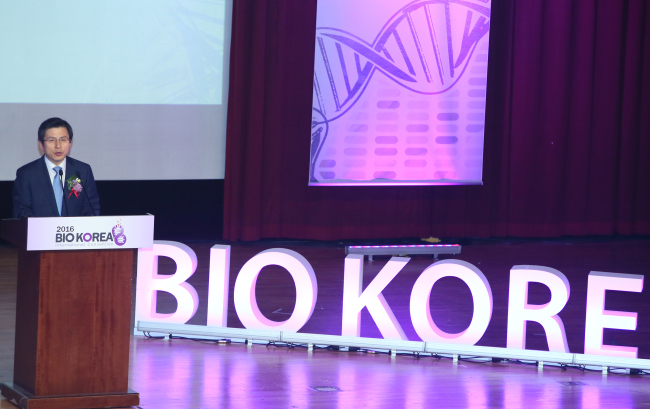The South Korean government reaffirmed its pledge to support the growth of the nation’s biotechnology and health care sector at the Bio Korea 2016 international convention, which kicked off Wednesday at Coex in southern Seoul.
The three-day convention -- which brought together some 23,000 industry officials to discuss and spotlight the latest trends in the local and international bio-health industry -- comes amid Seoul’s efforts to turn it into the country’s next economic growth engine.
 |
Prime Minister Hwang Kyo-ahn delivers a speech at the opening ceremony of Bio Korea 2016 international convention held at Coex, Samseong-dong, Seoul, Wednesday. (Yonhap) |
“The government will actively nurture Korea’s bio-health industry with aims to place Korea as one of the world’s top seven health care leaders,” said Prime Minister Hwang Kyo-ahn in his opening remarks.
To help achieve the goal, Hwang said the government would create a special committee tasked with overseeing all legislations linked to biotech and health care in order to improve related tax, financial and pricing regulations.
“At the same time, we will boldly abolish policies that hamper the development of new technologies and new business creation” in order to accelerate the development of new drugs, medical devices, stem cells and regenerative medicine, among others, he said.
The prime minister further expressed “high hopes” that local companies in the field will expand their global presence in the years ahead, referring to recent success cases like Hanmi Pharmaceutical. In 2015, the local drug maker sealed seven mega biopharma technology export deals worth some 8 trillion won ($6.93 billion) with multiple global pharma giants.
“Equipped with the advanced sciences and quick implementation skills, Korea has great potential to lead the world’s new drug development efforts,” said Hanmi Pharmaceutical president and CEO Lee Gwan-sun, highlighting his company’s much-celebrated success in 2015.
“Global pharmaceutical giants are more focused on outsourcing new technologies rather than self-development. With promising drug candidates and good scientific data, there are always opportunities.”
In regards to negotiating licensing deals, Lee advised that the task should be led by not only the related researchers and employees but also the company executives, who can play an integral role in striking a “good deal.”
As Korea’s new drug development efforts are underway, director and founder of Seoul-based Digital Healthcare Institute Choi Yoon-sup urged the public to take note of a new trend toward digital health care -- the use of information and communications technologies to address a person’s health problems.
“Digital disrupts everything, and health care is not an exception,” Choi said. “By utilizing the extensive data compiled by our bodies every day, many new health care technologies are born.”
For instance, sensors on smartphones and wearable devices can be used to monitor and collect data about a person’s body condition. This resource can be used to evaluate a person’s health and even predict ailments -- a service previously available only at hospitals.
Personal genome analyses are able to reveal health risks that a person may be particularly susceptible to, while artificial intelligence and deep learning already help doctors prescribe the best treatment for cancer, Choi explained.
For Korea’s digital health care segment to advance, information privacy and ownership issues must be well regulated, the expert said, urging the government to step up its efforts to enact “bigger changes” to its existing policies.
Meanwhile, director of Samsung Medical Center’s Institute for Refractory Cancer Research Nam Do-hyun discussed the foreseen advancements in precision medicine -- customizing health care treatments based on individual variability in genes, environment and lifestyle.
Korea Digital Hospital Export Agency chairman Lee Min-hwa stressed the importance of fostering successful start-ups in leading Korea’s bio-health innovation.
Bio Korea 2016 will continue until Friday. For more information about the convention, visit www.biokorea.org.
By Sohn Ji-young (
jys@heraldcorp.com)






![[Herald Interview] 'Trump will use tariffs as first line of defense for American manufacturing'](http://res.heraldm.com/phpwas/restmb_idxmake.php?idx=644&simg=/content/image/2024/11/26/20241126050017_0.jpg)
![[Exclusive] Hyundai Mobis eyes closer ties with BYD](http://res.heraldm.com/phpwas/restmb_idxmake.php?idx=644&simg=/content/image/2024/11/25/20241125050044_0.jpg)
